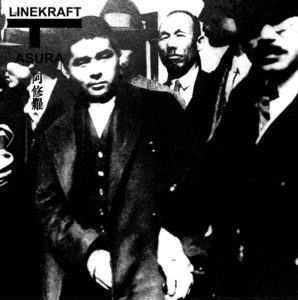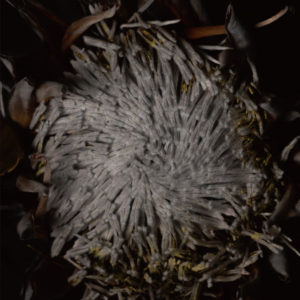KK. Null Interview (2006.04.18)
This interview with noise musician KK. Null was arranged back in 2006, when he played in Budapest (2006 Apr 18 @ Trafó Bár Tangó) during his joint tour industrial pioneer Z’EV. There was no more scheduled interviews and we had a lot of time between the soundcheck and the show, so what started out as a short interview turned into an in-depth one. It was actually more like a lengthy, friendly discussion about his career, influences, various projects and future plans… including the first ever public mention of the then upcoming Zeni Geva reunion. Which happened about a year later, was followed by several tours and eventually another interview in 2014.
Now you are touring together with Z’EV, one of the most important figures of industrial music and recently you also made two albums together with him. How did you get to know him and start to work together?
KK. Null: I have been a big fan of Z’EV ever since the early 80s; he was one of my big heroes, one of the pioneers of industrial music and industrial culture. And I think he also knew my music for a while and knew what I’ve been doing, but we have never met each other earlier, until 2003, when I had a concert in Paris. At that time he was staying in Paris for a few months, doing music for a theater and he showed up at the event. But before the concert, when we went to have dinner after the sound-check, in a restaurant near the venue he also showed up there. Actually in the beginning he was just sitting there. I recognized him, thinking “He must be Z’EV!” because, you know, he looks very typical. I wondered, “Oh! What is he doing here!?” and then he eventually came to me and introduced himself and we started to talk. And then of course he also saw my performance and he liked it very much and after the concert he offered to do collaboration together and I was like “Of course!”. To me it is like a dream come true. “Yeah, why not! I would love to!”
So, first idea came from Z’EV and he had a strange concept. Honestly 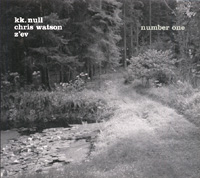 I’m not sure if I understand all his ideas, but they are based on traditional Japanese Noh theater. After the concert he told his concept to me like “blahblablablabla” and maybe I could understand about half of it. But anyway, I wanted to work with him, so I said “Yeah, okay. Let’s do it!”. So, then we started to work together. He knew Chris Watson (Founding member of two important industrial / experimental legends, Cabaret Voltaire and The Hafler Trio he later moved on to recording nature sounds in various hardly accessible regions of the Earth.) for a long time and asked him to contribute some from his recordings archive to our music and then Z’EV sent me his sound files and also Chris Watson sent me several of his recordings, which were recorded in Africa. So, at the beginning I mixed everything in my home studio and then sent it back to Z’EV who edited and mixed it again. So, that’s how we made the album “Number One”, which came out on Touch last year. It was great.
I’m not sure if I understand all his ideas, but they are based on traditional Japanese Noh theater. After the concert he told his concept to me like “blahblablablabla” and maybe I could understand about half of it. But anyway, I wanted to work with him, so I said “Yeah, okay. Let’s do it!”. So, then we started to work together. He knew Chris Watson (Founding member of two important industrial / experimental legends, Cabaret Voltaire and The Hafler Trio he later moved on to recording nature sounds in various hardly accessible regions of the Earth.) for a long time and asked him to contribute some from his recordings archive to our music and then Z’EV sent me his sound files and also Chris Watson sent me several of his recordings, which were recorded in Africa. So, at the beginning I mixed everything in my home studio and then sent it back to Z’EV who edited and mixed it again. So, that’s how we made the album “Number One”, which came out on Touch last year. It was great.
Since then, you made another album with him, called “Artificial Life”. Is that similar in sound to “Number One”?
KK. Null: No, I think it is quite different, because “Artificial Life” is based on a live performance of Z’EV, which was recorded last year, somewhere in Germany… I think in Berlin. So, it is basically a live recording and I put my electronic noise on top of that. It is more live.
Is that album out already?
KK. Null: Yes, it just came out about two weeks ago, so we have it here tonight.
You usually perform with a self-made instrument, called Nullsonic. Exactly what it Nullsonic and how did you came up with the idea to create it?
KK. Null: Oh yes. First, about the name. I’m a big fan of King Crimson, the prog-rock band, and their guitarist, Robert Fripp made an effect-pedal and named it Frippertronic. So, when I made Nullsonic I also named it after myself. And I made it, because, especially when I was touring I realized that it is very difficult to carry all the equipment and gear. It is just too heavy to carry, so, I had to think about a more handy way to carry my gear and I decided to do it this way.
First I make some sound material in my home studio with synthesizer and effect pedals and so on and I put all those on mini-disc, so I have a kind of a sound-card or sound-file. So I have several, different kind of sounds on mini-disc and at the live performance. And now I have two Chaospads, which is a small equipment with a touchpad, that controls the effects and it also has a sampler. So I use it with the sound material, to sample it and create something different, so that is basically what I’m doing live.
So it is half improvisation?
KK. Null: Yes, it is half composed music and half improvisation.
And where did the name Null came from?
KK. Null: Oh, it was a long time ago, at the very beginning of my career. One of my favorite Japanese authors had a small magazine called Null and because I liked his work I took the name. And at that time I did not know the meaning, I just liked the letters and thought it sounded cool. And at first Null wasn’t just me, it was a group, but then everyone left and I kept the name. And KK comes from my real name, Kazuyuki Kishino, so I started to use it as KK. Null. And of course later I found out the meaning, that Null means zero and I thought it is cool… kind of nihilistic, but not in a negative way. And now it is also used in computed programming, meaning something like ‘clean’.
Recently, a few years ago you restarted your old, experimental rock band called ANP, Absolute Null Punkt. Can we expect some new material?
KK. Null: Yes, actually two albums are waiting to be released from ANP. One is a live recoring, recorded in France and Switzerland and the other one is kind of a mix of studio recordings and live performances. Actually it is mostly studio material, with some live recordings from Moscow, but you can’t tell which is live and which is studio, because it is mixed together.
In recent years, you were performing a lot in Russia and also working with Alexei Borisov. How did your collaboration start?
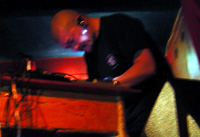 KK. Null: Hmmm.. It began in 2002, the same year when I played here in Budapest for the first time. After Budapest I went to Russia, also for the first time, to play in some festivals in St. Petersburg and Moscow and I met Alexei in Moscow. I do not speak Russian, so I needed someone’s help and he speaks very good English and he was a kind of a guide for me. I was staying in Moscow for three days and he came to the hotel every day, to take me to somewhere, to sightseeing and such and he was very nice. Very intelligent as well, working as a journalist and also he is about the same age as me. You know, same generation, same influences. So we got along very well.
KK. Null: Hmmm.. It began in 2002, the same year when I played here in Budapest for the first time. After Budapest I went to Russia, also for the first time, to play in some festivals in St. Petersburg and Moscow and I met Alexei in Moscow. I do not speak Russian, so I needed someone’s help and he speaks very good English and he was a kind of a guide for me. I was staying in Moscow for three days and he came to the hotel every day, to take me to somewhere, to sightseeing and such and he was very nice. Very intelligent as well, working as a journalist and also he is about the same age as me. You know, same generation, same influences. So we got along very well.
And how do you work together with him?
KK. Null: Mailing. He sends me his stuff and I mix it with my music, so that’s how. And in 2004 we played our first concert in Moscow, which was recorded and it will come out in a new Russian label called Electroclub in the near future.
And do you have any special memories from your previous performance in Budapest, at X-Peripheria Festival in 2002?
KK. Null: What I remember most is that it was very hot. It was mid-summer and before Budapest I was in Vienna, I think and it was okey there and then we came to Budapest and it was so hot here. And I did not have short-pants, so I had to borrow one from Andras (Nun Andras, organizer, working for Ultrahang) and that’s what I was wearing on-stage. *laughs*
And how about your most well-knows project, Zeni Geva (Null’s legendary ‘progressive hard-core’ band, where he sings and plays guitar.), which stayed silent during the last few years. Can we expect some activity in the future or is it just a part of the past now?
KK. Null: Oh no, we have been inactive for a while, but it does not mean that we broke up, it is just that we needed a break, to get more motivation. So, now I’m concentrating more on electronic music. But I want to come back with Zeni Geva, hopefully next year. Actually I just talked to the other guitarist, Mitsuru Tabata and he also wants to start again, so maybe later this year we will start practicing and rehearsing in the studio to see what goes on.
And what about your other side-project, Monster DVD? Is that still an active project?
KK. Null: No, that one is finished.
In the beginning of your career you was also learning butoh dancing. Did you ever think about making music for a dance performance?
KK. Null: Yeah, I would like to do something like that… making music for a dance company. But by the way, there seems to be some misunderstanding about my connection with butoh dancing. Some people think that I am a professional dancer, but actually I was just studying it for a while.
Your label, Nux Organization, released the first recordings from Melt-Banana. Do you still follow what they are doing nowadays?
KK. Null: Ah, not really we just meet once in a while. I just know they are very active and busy and they tour a lot in Europe and America. I’m impressed by their energy.
What other artists did you release on Nux, beside Melt-Banana?
KK. Null: Only one other band. Their name was Space Steakings, but they already broke up.
Beside Nux, you also release a lot of your works on other labels all round the World. How do you chose the labels you work with?
KK. Null: Sometimes they contact me and sometimes I contact them, so either way.
Even tho nowadays you are better known for your electronic music originally you started as a guitarist. Could you tell us about the very beginning of your career as a musician? What made you decide to start making music and what were your most important early influences?
KK. Null: It was Fred Frith. He came to play in Japan for the first time in… 1980 I think… or maybe it was 1981. And before I had seen his performance I was very conservative about about guitar playing, but suddenly he changed my way of thinking. He didn’t play the guitar the traditional way, he put his guitar on the table and was smashing, scratching it, making noise. And I was like “Oh, so you can do it like this as well!” So, he inspired me a lot.
And later you also worked with him.
KK. Null: Yeah, actually just once, I played with him live, but it was an amazing experience.
Is that the same recording that was later released on your Guitar Organism album?
KK. Null: Yes, it was that one.
And nowadays, what kind of music do you listen to the most?
KK. Null: Well, actually recently every day I’m listening to Miles Davis. But only a particular period. From around the seventies.. Bitches Brew, Fillmore and I also have some bootleg live recordings from the time.
Do you think about doing something similar?
KK. Null: Not really, I mean, I don’t want to be a follower. But… I tell you, actually I just started to play trumpet. *laughs* Of course it came as an influence from Miles Davis, but also, since recently I am concentrating on electronic and abstract music, but sometimes I feel that I want something more physical. So, it seemed like a good idea to play some more ‘primitive’ instrument. Because basically the trumpet is a very primitive instrument, very simple, but still difficult to play.
During your career you collaborated with a lot of people, both from Japan and from around the world. Is there anyone who you haven’t played with, but you would like to?
KK. Null: Hmmm… difficult question. *thinks for a while* Maybe Bernard Parmegiani. He is a French composer. A very old guy, I think he is 78 or 79. His work is kind of similar to Pierre Henry’s, but while everyone knows Pierre Henry, Parmegiani is still quite unknown. I think his work is more important and he is a very important figure in contemporary avant-garde music, but still nobody knows him, so I think he should get more attention. He came to Tokyo last year for the first time to give a concert there and I saw him and also talked to him. It would be fantastic to collaborate with him.
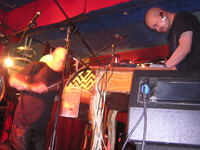 Your current joint tour with Z’EV is basically a UK only tour, with only two additional dates: Budapest and a festival in France. How come you did not go on a longer Euro tour?
Your current joint tour with Z’EV is basically a UK only tour, with only two additional dates: Budapest and a festival in France. How come you did not go on a longer Euro tour?
KK. Null: It was only because of our schedules. We couldn’t fit in more dates, but maybe next time we will play at more places. We still want to continue the collaboration, since Z’EV really likes to do it, so actually he already started to plan next year.
Amongst your upcoming projects there are two compilation albums related to movies that you will contribute a song to. On is a remix album of music from Kenneth Anger’s Lucifer Rising and the other is a tribute album to Japanese director Miike Takashi. How did you get involved in these projects?
KK. Null: Actually they just asked me to do a track. I never watched any film from Miike Takashi before, actually I didn’t even know who is him. It seems that he is very popular in Europe for some reason… very strange.
You also have an upcoming album together with Keiji Haino. Could you tell me about that one? Will that be more electronic or more of a guitar based album?
KK. Null: It is a kind of a compilation. Haino also plays many instruments and I also play some and this album is put together from several different live recordings. So in one track I play drums and he plays guitar, on another one we both play electronics or he sings and I play electronics, so it is quite diverse, kind of like a showcase.
Which one do you consider your best work to date? The one that you feel is just perfect as it is?
KK. Null: Oh, I’m not perfect yet. Not completely satisfied yet, so I can’t answer this. *laughs*
Very often noise and experimental musicians from the West has some political or occult concept that is represented in their music, like Z’EV’s involvement with Kabbala. Do you have any similar concept behind your music?
KK. Null: No, not at all. Except maybe that I am very inspired by cosmology, astro dynamics and that kind of science and also mathematics, but it doesn’t really affect my music.
In an earlier interview I read that you are interested in European traditional music and that you also like the Hungarian band Muzsikás.
KK. Null: Oh yes! Especially Márta Sebestyén, she has an amazing voice, I like her very much.
And have you ever thought about doing something based on traditional music?
KK. Null: Actually I already did, with a different band and in a different way. Do you know one of my old bands, called YBO2? It was more a prog-rock kind of band and sometimes we did… not really covers, we just took some traditional songs and transformed them into a different kind of music, for example ‘Boys Be Bedlam’.. do you know that one? *starts to sing the first few lines* So we made ‘alternative version’ from some songs like that one.
You also contributed one track to the Koji Tano (legendary Japanese noise / electronic musician, who died last summer) tribute album that was compiled by the Austrian label Steinklang. Did you ever work with Mr. Tano?
KK. Null: We knew each other well, but we just played a couple of shows together. He was one of the most important figures in not only the Japanese, but also in the international underground noise music scene. And he was also a very nice person and I visited him in hospital just about two weeks before he died. It’s all very sad.
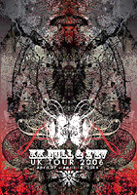 Your current tour poster was designed by Seldon Hunt (also known for his work with Neurosis, Isis, Kid 606 and so on) who also made several CD covers for you in the past. How did you start to work with him?
Your current tour poster was designed by Seldon Hunt (also known for his work with Neurosis, Isis, Kid 606 and so on) who also made several CD covers for you in the past. How did you start to work with him?
KK. Null: It began more than ten years ago, ’94 or ’95 when Zeni Geva played in Melbourne, Australia. And he is Australian, but for some reason he couldn’t come to the concert, but he gave his artwork to a friend and asked him to give me. So, his friend came to the show and told me about Seldon Hunt and that he is a fan of my music and gave me his artwork. First I was just like “Oh, okay” but then I checked his works and.. Wow! I was impressed, it was really great. So, that was the start and after that we contacted each other and I asked him to do artwork to some of my CDs.
And who designs your CD covers when you are not working with him?
KK. Null: Most of the artwork is done by me actually.
And one last question. Where did you get the idea to make a website dedicated to your chihuahua puppy, called Maru-chan?
KK. Null: Ah, actually it was my wife’s idea. We love our puppy so much and I don’t really know if it is cool or not, but she wanted to have a website about Maru-chan, so she made it. *laughs and looks towards the merchandise stand where his wife is arranging the CDs*
Thanks a lot for the interview and good luck for tonight!
Disclaimer: This interview was originally published at SoundOfJapan.hu (in English and Hungarian), but the English version was also included in the first issue of the now-defunct The Dose, an online pdf magazine.


